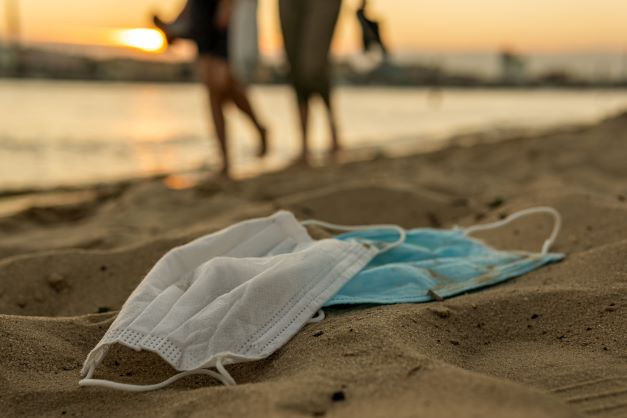Remnants of the pandemic
- Admin

- Jun 6, 2022
- 3 min read
Now that we’ve shed our face masks, they’ve become environmental hazards

By Phillip V. Cruz Jr.
On May 3, Gov. Lou Leon Guerrero lifted Guam’s mask mandate— making it an optional choice for residents and business establishments. For medical facilities, however, facemasks are still required.
Most of us have collected two years’ worth of face coverings made of different types of disposable and reusable materials, such as N95, surgical masks and cloths. They became part of our daily wear and accessories until the Covid-19 numbers subsided to a level that allowed us to go out in public and socialize with naked faces.
No hard data is currently available to quantify the volume of face coverings Guam has accumulated throughout the pandemic period, but discarded masks are ubiquitous around the island.
They’re on beaches, in public parks, parking lots and in random places. They are in trash bins that are emptied by garbage trucks that take them to the newly built third cell at the Layon Landfill. The government borrowed $30 million on the bond market to expand the landfill because the first two cells ran out of space last year.
ADVERTISEMENT
“Single-use face masks definitely contribute to the waste littered around the island and waste entering our Layon Landfill,” said Phillip John R. Cruz, coordinator at the University of Guam’s Center for Island Sustainability. “Since the pandemic, I've come across dozens of littered disposable face masks in parking lots and parks that have not been seen before. Every week, during the Guam Green Growth Island Beautification event, our team picks up disposable face masks in every village.”
Cruz cited the impact of single-use face masks on Guam’s environment and the ocean’s ecosystem. “Microplastics are an existing issue that is being exacerbated with the pandemic due to the increase in the use of single-use plastics, such as face masks, takeout food containers and plastic bags,” he said. “When ingested by marine life, toxins enter the bloodstream and are passed through the food chain, and can ultimately end with us.”
Managing face mask pollution is currently not part of any government discussion.
Cruz said face masks don’t have to be tossed away. “People should definitely keep some face masks for future use because they do help reduce the spread of any viruses,” he said. “If people have an abundance of face masks that are medical-grade, such as N95 masks, they can donate them to local healthcare facilities.”
Unfortunately, disposable face masks are “very difficult to recycle,” according to Paul Tobiason, president of the Recycling Association of Guam. “They are almost completely made of plastic material,” he said.
According to Sunline Supply’s website, which was shared by Tobiason in an email, “Face masks may look like they consist of recycle bin-friendly paper, but they usually have materials like polypropylene and polyester that won’t do well in the recycling system.”
ADVERTISEMENT
Sunline is a retail company that specializes in Covid-related products, such as test kits and protective gear including disposable face masks and gloves.
“Throwing away face masks can have significant ramifications for the spread of disease and for the planet,” reads an article posted on its website.
What happens to the face masks worn by those who contracted the coronavirus? Are they being handled as infectious waste?
Health experts warn that contaminated face masks, if not disposed of properly, can result in health risks and environmental damage. Improperly discarded masks can spread infection or substances to the surfaces they touch, even if it’s just the hand of someone who is cleaning the area where the masks were dropped, health experts said.
Face masks also include microfibers that don’t break down and elastic bands that can get caught in wild animals. “They can also end up in our waterways and pose pollution hazards, not to mention adding to the infection risk,” according to Sunline. “Any time they aren’t in the proper receptacle, face masks can cause significant problems for the planet and waste management efforts.”
Subscribe to
our digital
monthly edition









